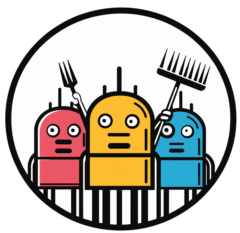Throughout history, certain places have acted as catalysts for intellectual and cultural explosions. Athens during the time of Socrates, Florence during the Renaissance, and Edinburgh in the 18th and 19th centuries all produced an outsized number of geniuses, reshaping the world in the process.
The question is: Can we recreate those conditions today?
The internet has given us instant access to knowledge, but it hasn’t led to another Athens or Florence. Instead, knowledge is fragmented, discourse is scattered across forums and social media, and many brilliant ideas die in isolation. Meanwhile, corporations patent ideas at an unprecedented rate, and many innovators fear sharing their best thoughts for fear of intellectual theft.
Imagine an AI-driven system that replicates the best aspects of history’s intellectual golden ages – a virtual city of ideas where thinkers, creators, and innovators can collaborate, debate, and refine their visions. Let’s call it Flothensburgh, a portmanteau of Florence, Athens, and Edinburgh.
Rather than leaving idea-sharing to chance, AI could actively facilitate intellectual collaboration:
- Identifying Emerging Ideas: AI could recognise patterns in conversations, detecting when multiple people are independently discussing similar breakthroughs, whether in AI, music theory, linguistics, or engineering.
- Connecting Thinkers in Real Time: Once AI spots an emerging topic, it could invite the relevant minds to a structured discussion – a virtual symposium where ideas can be developed collectively.
- AI-Mediated Debate & Knowledge Synthesis: Just as the Scottish Enlightenment thrived on rigorous debate, AI could act as a modern Socrates, prompting thinkers with challenges, counterarguments, and historical context.
- The Idea Vault: Protecting Intellectual Property While Encouraging Openness: One of the biggest hurdles to collaboration is the fear of idea theft. AI could provide a secure Idea Vault, timestamping contributions, generating open-source licenses, and even detecting if someone tries to patent an idea that was previously discussed in Flothensburgh.
- From Conversation to Real-World Impact: Instead of ideas disappearing into the ether, AI could help structure them into tangible outputs: collaborative research papers, open-source projects, grant proposals, or even automatic defensive patents to prevent corporate monopolisation.
While the potential of Flothensburgh is enormous, several challenges need to be addressed:
- Privacy & Security: Ensuring that discussions remain protected, with users able to opt-in to different levels of disclosure.
- Legal Frameworks: The Idea Vault would require international legal backing to prevent predatory patenting.
- Corporate Interests: Tech companies might resist a system that democratises intellectual property and prevents them from patenting open-source ideas.
- Human Behaviour: Can AI foster the same kind of intellectual vibrancy that cities like Florence and Edinburgh did, or is physical proximity essential?
A system like Flothensburgh could be built by an AI company like OpenAI, a coalition of universities, or an independent organisation focused on open knowledge. OpenAI, in particular, has the resources and expertise to integrate AI-driven knowledge synthesis with ethical considerations for intellectual property.
But it won’t happen unless someone takes the first step.
If we could create a digital Flothensburgh, we wouldn’t have to wait for the next Renaissance – it would be engineered, nurtured, and accelerated by AI. This system could give rise to a new generation of thinkers, solving problems at an unprecedented pace, free from the bottlenecks of traditional academia and corporate control.
The only question is: Who will build it?
